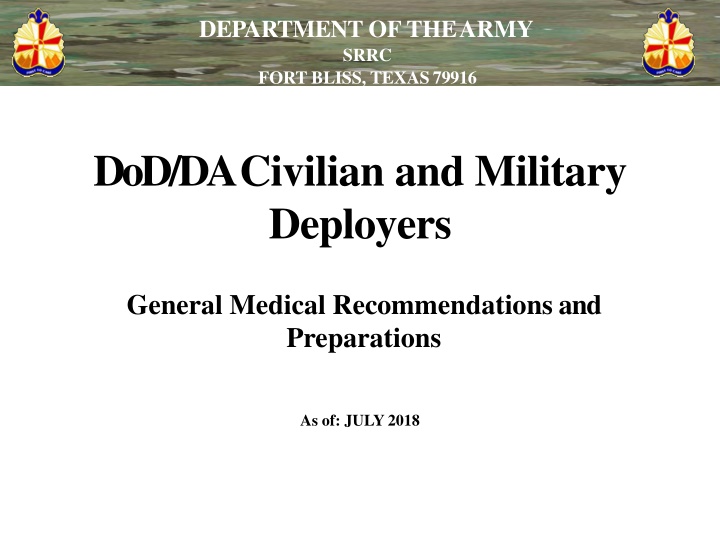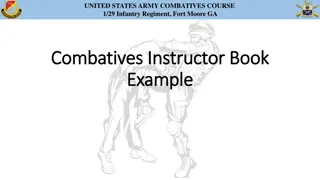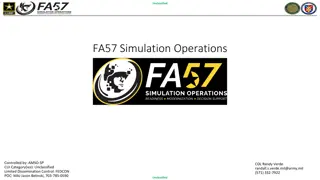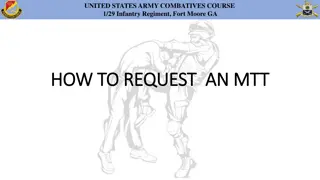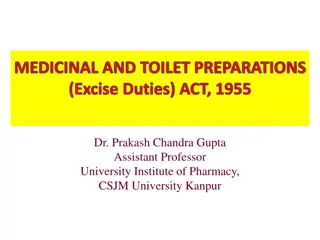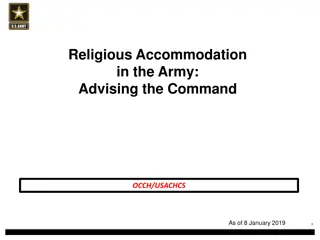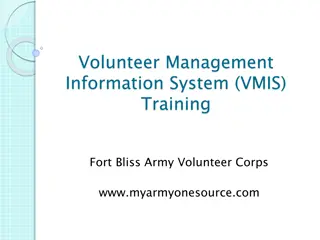Medical Recommendations and Preparations for Deployers at Department of the Army, Fort Bliss
General medical recommendations and preparations for DoD/DACivilian and Military deployers at Department of the Army, Fort Bliss, Texas in July 2018. Guidelines include pre-deployment health assessments, fitness standards, vaccination requirements, and documentation needed for deployment. Ensure medical readiness by reviewing references and meeting all deployment criteria.
Download Presentation

Please find below an Image/Link to download the presentation.
The content on the website is provided AS IS for your information and personal use only. It may not be sold, licensed, or shared on other websites without obtaining consent from the author.If you encounter any issues during the download, it is possible that the publisher has removed the file from their server.
You are allowed to download the files provided on this website for personal or commercial use, subject to the condition that they are used lawfully. All files are the property of their respective owners.
The content on the website is provided AS IS for your information and personal use only. It may not be sold, licensed, or shared on other websites without obtaining consent from the author.
E N D
Presentation Transcript
DEPARTMENT OF THEARMY SRRC FORT BLISS, TEXAS79916 DoD/DACivilian and Military Deployers General Medical Recommendations and Preparations As of: JULY 2018
References for Medical Processing Department of the Army Personnel Policy Guidance (PPG) for Overseas Contingency Operations, Chapter 7, update 22 MAY 2012: https://www.cpms.osd.mil/expeditionary/pdf/PPG.pdf DD 2795 Pre Deployment Health Assessment should be completed by the deploying individual within 120 days of arrival at CRC, Fort Bliss (This will be validated and signed by a Provider at SRRC) If going to CENTCOM: Mod 13: Individual Protection and Individual/Unit Deployment Policy: https://www.express- scripts.com/TRICARE/tools/USCENTCOM_MOD_THIRTEEN.PDF PPG- Tab A: Amplification of the Minimal Standards of Fitness for Deployment: https://www.express- scripts.com/TRICARE/tools/USCENTCOM-MOD-13_TAB- A.pdf
Getting Ready to Deploy You are responsible for arriving medically ready todeploy Purpose of this Medical Review: Validate your current medical and health status to ensure you meet deploymentrequirements. Check all references. Ensure you are within medical fitness standards. Review the cited references with your Health Care Provider. Ensure you can: Understand and accomplish the mission Arrive at SRRC medically ready Arrive at SRRC with all of the medical documentation required for waiver request (if eligible and not previously submitted)
Getting Ready to Deploy Accomplish medical requirements as soon as possible and complete vaccination requirements at least 30 days before arrival to maximize level of disease protection DoD beneficiaries: When obtaining your prescription medications at home station, register for mail order refills at: https://www.express- scripts.com/TRICARE/index.shtml DoD beneficiaries: See the Deployment Prescription Program slides: https://tricare.mil/dpp
Documents to Bring to Medical SRRC Travel/Deployment Orders identifying deployment location No orders = No Medical SRRC You must meet medical requirements for all destinations identified on your orders Copy of medical records related to: Significant current or past medical issues that may affect deployability Mental health history and treatments Documents related to a VA Disability Rating Military only: DD Form 2766 Adult Preventive and Chronic Care Flow sheet (yellow folder) Can be from a prior deployment; this serves as your deployment medical record
Documents to Bring to Medical SRRC Obstructive Sleep Apnea: Bring a copy of initial (untreated) sleep study results and card reading/download from CPAP machine showing adherence. *May require waiver* Adherence is defined as PAP machine data download (i.e. compliance report) that reveals the machine is being used for at least four hours per night for greater than 70% of nights over the previous 30-day period. CPAP must have a rechargeable battery backup and sufficient supplies for the deployment duration. Suggest hand carry to CRC to avoid damage, but do not bring CPAP machine to Medical SRRC Asthma or COPD prescribed/requiring medication: (inhalers, etc.) Bring copy of a pulmonary function test. *May requirewaiver* Copy of medical documentation for chronic conditions. *May require waiver* Letter from your surgeon indicating your recovery is complete if deploying within one year of surgery date
Documents to Bring to Medical SRRC Copy of medical records or letter from Medical/Behavioral Health Provider treating any psychiatric disorders (anxiety, depression, PTSD, etc.) stating: Stability for at least three months using the same treatment and are not expected to decompensate in a deployed environment Same treatment is defined as having used the same dosage of current medication for at least 90 days without the discontinuation of any other behavioral health medication during that 90 days No inpatient/residential psychiatric or substance abuse treatment in the past 12 months (requires waiver if within past 12 months) Copy of results of Neurological and/or Psychological evaluation if history of Concussion/Traumatic Brain Injury (even if mild)- May be accomplished by your Primary Care Provider Copy of all waivers and response from applicable COCOM
Documents to Bring to Medical SRRC (Tuberculosis Screening/PPD) If you have ever had a positive TB skin test, bring recordsdocumenting: Proof of previous BCG Vaccination History of exposure toTB, proof of past treatment No TB symptoms currently exist, results ofchest X ray (a one time normal chest x-ray) Documentation of completed public health nursing evaluation for TB disease and counseling for latent tuberculosis infection
Documents to Bring to Immunization Section Your MEDPROS Individual Medical Readiness Report If your clinic cannot enter vaccinations and lab tests into MEDPROS, bring paper documentation All records of valid vaccinations (or lab results demonstrating immunity) Serum titers are acceptable proof of immunity for Hepatitis A, Hepatitis B, MMR (measles/mumps/rubella), and VZV (varicella or chickenpox) CDC (formerly PHS) 731 (yellow shot card) if your deployment requires yellow fever or polio vaccination If you do not have a CDC (formerly PHS) 731, one will be provided at SRRC Immunizations
Immunizations Screening Requirements Review references with your Health Care Provider to understand all requirements At minimum, the first vaccination in a series is required to deploy, unless medically or administratively contraindicated Recommend receiving required vaccinations at least 30 days before arrival to SRRC Polio booster vaccination is currently required prior to entry into Afghanistan orPakistan forgreater than fourweeks,duetoacurrentpoliooutbreakinthesecountries Your Combatant Command Immunization Requirements can be foundat: https://health.mil/Military-Health-Topics/Health-Readiness/Immunization- Healthcare/Vaccine-Recommendations/Vaccine-Recommendations-by-AOR
Vision Screening Requirements Vision Prescription (valid for 24 months) Two (2) pairs prescription eyeglasses One (1) pair prescription protective mask inserts One pair (1) of inserts for ballistic eye protection Inserts from prior deployment are ok if prescription still valid; these will be provided, if needed NO contacts lenses are to be worn while deployed to an austere environment or during CRC process (to include SRRC processing) Eye surgery must NOT be using steroid eye drops Letter from eye doctor clearing you after PRK/LASIK, if deploying within 90 days of the surgery, must not need follow up Letter from eye doctor clearing you after LASIK surgery, if deploying within 30 days of surgery, must not need follow up
Documents to Bring to Medical SRRC (Audiology) Hearing Assessment/Audiology: DD Form 2215 - hearing exam completed and certified by an Audiologist within 90 days of SRRC processing and the following MUST be documented Name, SSN, Credentials of the authorizing Audiologist (M.D/D.O), Audiologist s NPI Number, and Audiologist s signature If performed by an audiology technician: needs CAOHC certification number Audiometer make, model, serial number, and calibration date (within one year) Audiologist must perform diagnostic audiogram to include air, Bone, SRT, speech recognition, tympanometry, Sprint or hint screening if audiogram exceeds the following thresholds: Audiometer average level for each ear 500, 1000, 2000 Hz, not more that 30dB or Not more than 30dB with no individual level greater than 35 dB at these frequencies, and not more than 55dB at 4000Hz; or audiometer level 30dB at 500Hz, 25 dB at 1000 and 200Hz, and 35 dB at 4000Hz in better ear. All requirements listed are Mandatory to be considered a Valid Audiogram. Hearing aids and six months supply of batteries
Documents to Bring to Medical SRRC (Dental) DD Form 2813 (DoD Active Duty/Reserve Forces Dental Examination): Valid for one year. Must document: Dental Classification (Class 1 or 2) Class 3: are non-deployable, corrective dental action must be completed and a new DD Form 2813 indicating new dental class of 1 or 2. Bitewing and Panoramic X raysrequired to be reviewed by dentist and block 6, item 5 marked yes and date that is either prior to or same day as the exam. Dentist s information: Name, State Dental license number, Office address, Office phone number
Documents to Bring to Medical SRRC (Dental) Individuals with Orthodontic appliances are non-deployable without a waiver. Bring these documents: Waiver response if Orthodontic appliances worn If no waiver request submitted prior to arrival, please provide a letter of evaluation from Orthodontic Provider stating that wires with neutral force are in place
Documents to Bring to Medical SRRC (Physical Exam) Copy of physical examination report Completed within 90 days of deployment due to being valid for 15 months (allows for 12 month deployments because performing a physical in theater may not bepossible) DoD civilians may use SF 178 or DD Forms 2808 and2807-1 A Periodic Health Assessment performed as a service member or FAAcertificates ARE NOT acceptable substitutes Physical examination results mustreflect: The Deployer is psychologically and physically fit for working in an austere environment and capable of wearing respiratory, chemical, and biological protectiveequipment ECG/EKG (if 40 years of age or older): within the past five years Results of Framingham Calculationif: 40 years old and older and/or if treated for Diabetes Mellitus Type2
Documents to Bring to Medical SRP (Physical Exam) If Framingham Calculation is > 15% for a Deployer who is older than 40 years old and/oris treated for Diabetes Mellitus Type 2, bring: Results of cardiology evaluation with a completed Stress echocardiogram, or Nuclear Stress Test PCM or Cardiologist recommendations to deploy Requires a Waiver
Documents to Bring to Medical SRRC (Physical Exam: Lab Requirements) Labtestrequirements(must haveresultsfrom thelab, notwritten on physicalexam) Blood type and RH factor labresults: One time draw G6PD labresults: One time draw Lipid panel results required within five years (ensure results meet CENTCOM standard) Military 40 years or older DoD/DA Civilians 35 years or older Hemoglobin A1C (within 90 days) if you have Diabetes Mellitus or if you take a medicine typically used for Diabetes Mellitus Sickle Cell screen (one time draw): PACOM, AFRICOM, and EUCOM
Documents to Bring to Medical SRRC (Physical Exam: Lab Requirements) Negative Pregnancy test results within 30 days of departure to theater* If during Medical SRRC a vaccination is required, females must have a blood pregnancy test drawn prior to receiving the vaccination (done at SRRC lab)* * Exemptions to pregnancy testing are the following (with documentation): Bilateral tubal ligation, Hysterectomy, or are Post menopausal
What to Bring to Medical SRRC (Medications) Chronic/daily use medications Bring 180 days supply or an amount sufficient to cover the entire deployment if < 180days Certain medications require a Waiver; refer to the CENTCOM formulary for restricted medications and those that do require a waiver. https://www.express-scripts.com/TRICARE/tools/deployedrx.shtml (The CNS Psychotropic List Sheet states which medications require waivers and which are non-deployable) All COCOMS follow CENTCOM Formulary Come prepared. Please do not expect to get your deployment supply of daily medications at a Fort Bliss Military Treatment Facility. Malaria preventionmedications will be provided to you at the SRRC site with instructions, if required per theater of operations. Inform the SRRC provider if you have any medicationallergies Allergy warning tags (Red ID/Dog Tags with allergen listed). These can be provided at SRRC if needed.
Waivers If you need a waiver to deploy, we recommend your organization request one at least 30 days prior to arrival at SRRC site. Results must be presented to the SRRC Providers (See PPG, MOD 13 Tab A, and the CENTCOM formulary for details). If a waiver is initiated during the Medical SRRC, there is a risk of delayed departure. Waiver may take a week or longer to be approved. Bottom line: Have all your information and documents ready to ensure an easy process.
Waivers When assigned to CENTCOM, the CENTCOM Surgeon is the Approving Authority for all medical and behavioral health conditions: Send requests to: usarmy.shaw.usarcent.mbx.surg-waiver@mail.mil If assigned to ARCENT, send requests to:arcent waiver@arcent.army.mil The SOCCENT Surgeon is the approving authority for all Special Operations Personnel. The other Component Surgeons are the delegated Approving Authority for all medical conditions in their respective AORs (AFRICOM, EUCOM, NORTHCOM, PACOM/USFK, and SOUTHCOM).
Common Documents Required for Waivers BMI over 35 DA Form 5500 Diabetes Mellitus HgbA1C within past 90 days, list of ALL medications SleepApnea ORIGINAL sleep study documenting untreated severity, 30-day compliance download within past 30 days, list of ALL medications Framingham >15% Cardiac evaluation (nuclear stress test preferred), list of ALL medications, lipid panel results Hypertension medicationchange within 90 days Five-day blood pressure check on current dosage of medication, list ofALL medications Behavioral health medicationchange within 90 days Documentation of stability at current regimen anddosage ADHD medications, Benzodiazepine, Antipsychotic, Sleep medications (i.e.Ambien, Lunesta), Anticonvulsants Documentation from treating provider including diagnosis, medication regimen, stability, length of time on medication, any adverse reaction/side-effect from medication Seizure disorder/Narcolepsy Documentation from Neurologist including diagnosis, last seizure/cataleptic event, medication regimen, stability, length of time on medication, any adverse reaction/side-effect frommedication
Medical SRRC Determination Cleared todeploy : Meets all the theater medicalrequirements Is medically ready todeploy Not cleared todeploy : Does not meet all theater medical requirements Is not medicallyready to deploy DelayDeploy : Does not meet all theater medicalrequirements Not yet medically ready to fly out, but is expected to meet theater medical requirements within a short period of time (usually one to two weeks) Continue training and processing until determined cleared to deploy or not cleared. Deployer will check in with Case Management or Company LNO until medical issues are resolved and Deployer is released bySRRC.
Questions Call if your questions are not addressed in these slides, the PPG or the Mod 13: Fort Bliss SRRC Medical Operations at (915) 742-6855 We look forward to seeing you!
Glossary of Terms/Acronyms SRRC: Soldier Readiness and Resiliency Center CRC: CONUS Replacement Center NLC: Non-Log Cap MOD 13: Modification #13 to the U.S. CENTCOM Individual Protection and Individual-Unit Deployment Policy PPG: Personnel Policy Guidance
